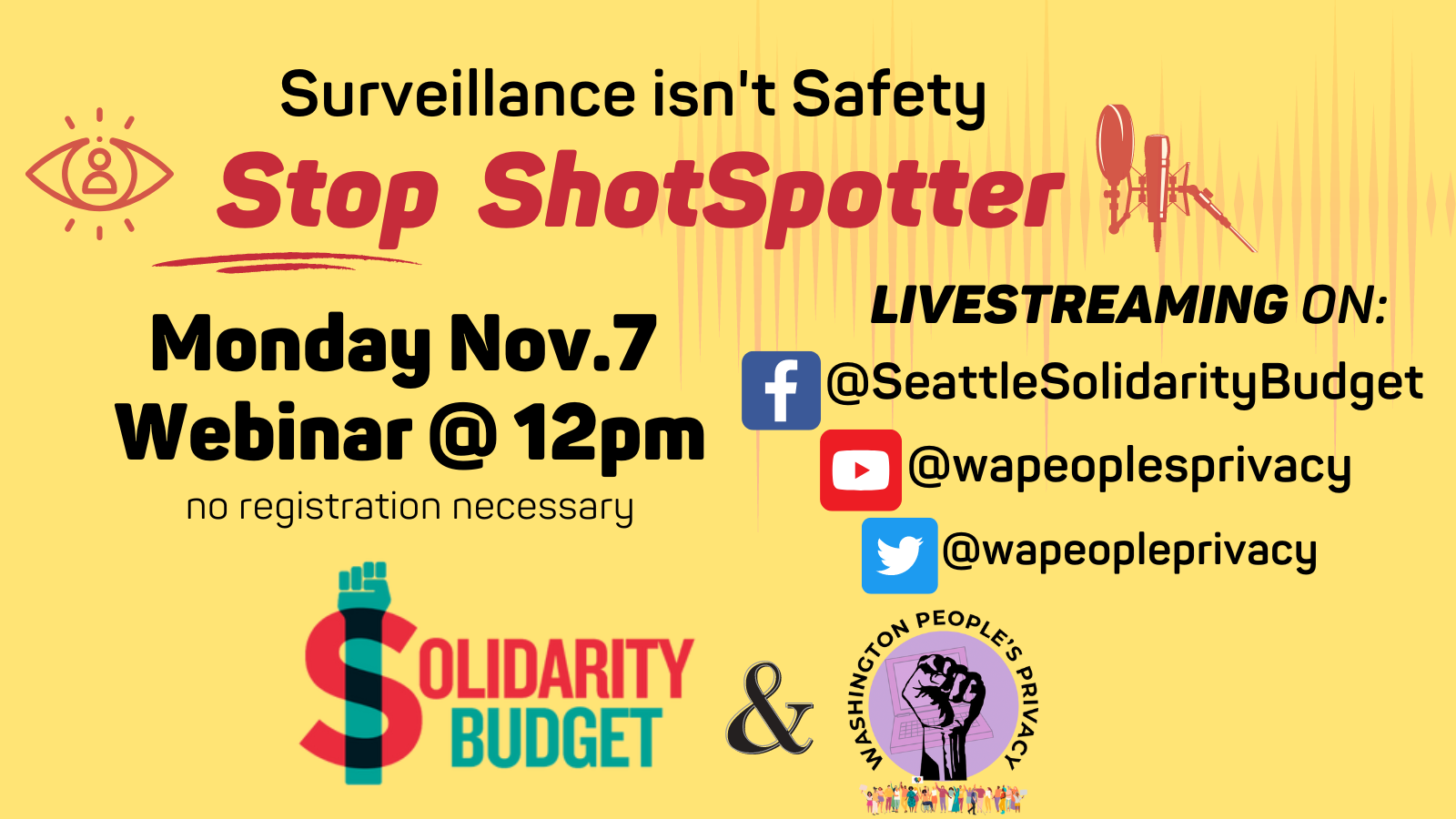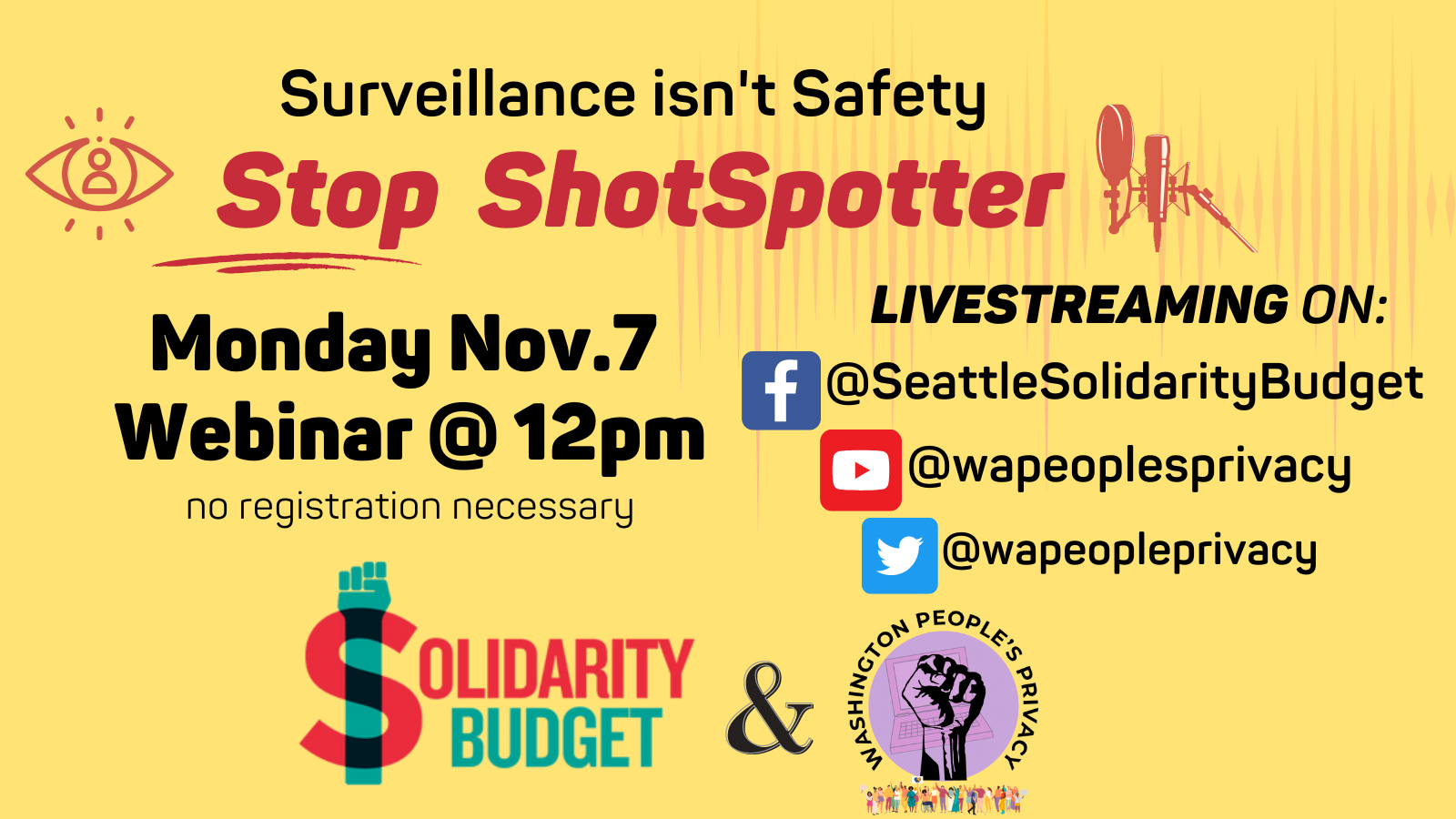#StopShotSpotter: Seattle Update
Gun violence is a huge problem. Will ShotSpotter help? What are the costs?

Seattle Mayor Harrell’s budget allocates $1 million for a "gunfire detection system" – presumably ShotSpotter, which Harrell's tried to bring to Seattle for over a decade. As Lauryn Bray's Community Groups Say ShotSpotter in Proposed Mayoral Budget May Harm South End in the South Seattle Emerald, there's a lot of opposition to this surveillance technology in the Rainier Beach neighborhood where it would be deployed initially.
And for good reason! Systems like ShotSpotter don’t reduce crime or even produce evidence that can be used in court cases. Instead, they waste police time and resources – and harm people in the communities they’re supposed to protect. In Chicago, police responding to a ShotSpotter alert shot and killed 13-year-old Adam Toledo. Michael Williams and Daniel Ortiz were wrongfully arrested as a result of ShotSpotter.
FIND OUT MORE!
Join Solidarity Budget, WA People's Privacy, Michael Williams, local organizers and members of the national #StopShotSpotter coalition for a webinar on Monday, November 7, at 12:00 pm Pacific time – streamed on YouTube, Facebook, and Twitter
TAKE ACTION!
If you're a Seattle resident, tell the CPC not to waste $1 million on ShotSpotter!.
But there's also some support for ShotSpotter in the community that's targeted for initial deployment. As Shaun Scott, community organizer and policy and field manager for the Statewide Poverty Action Network, says
“There’s a certain subsection of folks or certain impacted groups within South and Central Seattle that might have a traditional view of the role that policing could play... Which is to say, [they think] maybe having more intense police presence would make our neighborhoods safer.”
Both of those perspectives were on display in the Seattle Community Police Commission's November 2 discussion of ShotSpotter – here's my live-tweeting. UW Professor Angélica Cházaro, who had helped organize a Rainier Beach commuity forum on public safety last week, shared perspectives from community members. For example
"ShotSpotter is giving them a license to hunt bodies. It's a waste of money. It's about control."
But Victoria Beach, chair of the SPD African American Community Advisory Council, saw it differently:
"If it saves one life, I'm for it."
There's no question that gun violence is a huge problem, in Seattle and around the country – and that it disproportionately affects people in Black and brown communities.
What is much more of a question is whether ShotSpotter helps.
The largest study to date, a meta-review looking at 68 cities, found that ShotSpotter “has no significant impact on firearm-related homicides or arrest outcomes.” And as Cházaro discussed at the CPC meeting, ShotSpotter also doesn't produce evidence that holds up in court. Chicago Police Department's Office of the Inspector General (OIG) concluded that the data "does not support a conclusion that ShotSpotter is an effective tool in developing evidence of gun-related crime."*
ShotSpotter argues that all the studies showing it doesn't have an impact are wrong, instead pointing to a"evidence" like a shoddy "independent" study it commissioned that claims it's "97% accurate".** They also point to other potential benefits; at the CPC meeting, for example, ShotSpotter's Director of Public Safety Solutions Ron Teachman claimed that it saves lives by getting gunshot victims medical care more quickly. Once again, though, the research says otherise. Firearm Acoustic Detection in Hartford, Connecticut: Outcomes of a Trauma Center – Law Enforcement Collaboration compared gunshot incidents where shots were and weren't detected by ShotSpotter, and found there were no differences in prehospital treatment times, scene and transport duration, and injury severity, surgery or transfusion, lengths of stay, and disposition, including mortality.
Of course, potential benefits are only one side of the equation. It's also crucial to look at the costs. As well as false arrests and people killed by police responding to ShotSpotter alerts, Chicago found that the number of pat downs, searches, and enforcement actions increased when officers were responding to ShotSpotter.*** Not only that, some officers used the presence of ShotSpotter in a neighborhood even without an alert from ShotSpotter as reason in and of itself as to conduct “protective pat downs.”
Since ShotSpotter's primarily deployed in Black and Latinx areas (like Rainier Beach), all of this increases racial bias in policing – one of the reasons the MacArthur Justice Center has filed a class action lawsuit against ShotSpotter. And Black, Indigenous, and people of color are already subject to disproportionate rates of violence by SPD. What could possibly go wrong?
Speaking of costs: with Seattle facing a $50 million deficit, and the Mayor proposing shifting funding away from housing and Covid relief to plug the gap, $1 million for an initial deployment – a cost that's likely to grow signficantly over time – is a big issue as well. As Solidarity Budget organizer LéTania Severe says, “The budget is our values.” Violence interruption programs can reduce homicides and assaults by 30-50%, and community-based programs like Community Passageways, Choose 180, and Rainier Beach Action Coalition do great work in Seattle. Wouldn't it be better to send more money their way?****
While the CPC provides input, and the Mayor provides an initial draft of the budget, the Seattle City Council makes the decision. Since none of the Seattle Surveillance Ordinance requirements like a Suriveillance Impact Report and public comment period have occurred, the Council really should reject gunshot detection on process grounds. But there are enough pro-law-enforcement councilmembers that it's hard to know how the decision will go.
So now's a great time to take action – and to find out more, because I've only scratched the surface of the issues. Monday's webinar is a great opportunity to find out more. It's at 12:00 noon, and will be streamed on YouTube, Facebook, and Twitter.
TAKE ACTION!
If you're a Seattle resident, tell the CPC not to waste $1 million on ShotSpotter!.
FIND OUT MORE!
Join Solidarity Budget, WA People's Privacy, Michael Williams, local organizers and members of the national #StopShotSpotter coalition for a webinar on Monday, November 7, at 12:00 pm Pacific time – streamed on YouTube, Facebook, and Twitter
More on ShotSpotter in Seattle:
- Community Groups Say ShotSpotter in Proposed Mayoral Budget May Harm South End, Lauryn Bray, South Seattle Emerald
- Harrell’s Budget Would Resurrect Rejected Gunfire Detection System, Erica Barnett, PubliCola
- Council Member Opposes Mayor’s Plan to Spend $1 Million on Unproven Surveillance Tech, Will Casey, The Stranger
- Gunshot Detection Technology Spurs Debate Over Policing and Surveillance , Sarah Holder and Fola Akinnibi, Bloomberg
More on ShotSpotter elsewhere:
- Evaluating the Growing Movement to Stop ShotSpotter, Angrej Singh, Tech Policy Press
- ShotSpotter and the Misfires of Gunshot Detection Technology, STOP (Surveillance Technology Oversight Project)
- The Algorithmic Ecology of Shotspotter, Stop Shotspotter Portland
- Class Action Lawsuit Takes Aim at Chicago’s Use of ShotSpotter After Unfounded Alerts Lead to Illegal Stops and False Charges, MacArthur Justice Center (2022). The complaint has a lot more detail.
- ShotSpotter is deployed overwhelmingly in Black and Latinx neighborhoods in Chicago, Macarthur Justice Center
- Gunshot-Detecting Tech Is Summoning Armed Police to Black Neighborhoods, Todd Feathers, VICE, has data from Kansas City, Atlanta, and Cleveland as well as Chicago.

* One reason for this is that less than 10% of ShotSpotter reports produce anything prosecutors can potentially use as evidence of crimes. Another reason is that when prosecutors do try to use ShotSpotter as evidence, it's usually challenged; and since the company fiercely guards its proprietary algorithms, prosecutors wind up having to drop charges – Michael Williams was jailed for a year before prosecutors finally admitted they had insufficient evidence.
** The link above went to an analysis of the study. The study itself, on Edgeworth Analytics site is currently inaccessible.
*** One of the ShotSpotter employees at the CPC meeting misleadingly claimed that because ShotSpotter supposedly gives the location of the gunshots, it leads to less intrusive police searches – the exact opposite of what the actual data shows.
**** At the CPC meeting, ShotSpotter Director of Community Engagement Dr. Gerard Tate suggested that ShotSpotter data could complement violence interruption programs – but that ignores the reality of budgeting and the $50,000,000. Dr. Tate also talked about sharing ShotSpotter data for social workers ... but One in Ten Black Children in America Are Separated From Their Parents by the Child-Welfare System. A New Book Argues That’s No Accident (a discussion of Dorothy Roberts' book Torn Apart: How the Child Welfare System Destroys Black Families--and How Abolition Can Build a Safer World) or Roberts' shorter work such as The Reproductive Violence of Family Policing & Separation and Abolish Family Policing, Too, highlights the perils of that approach.
